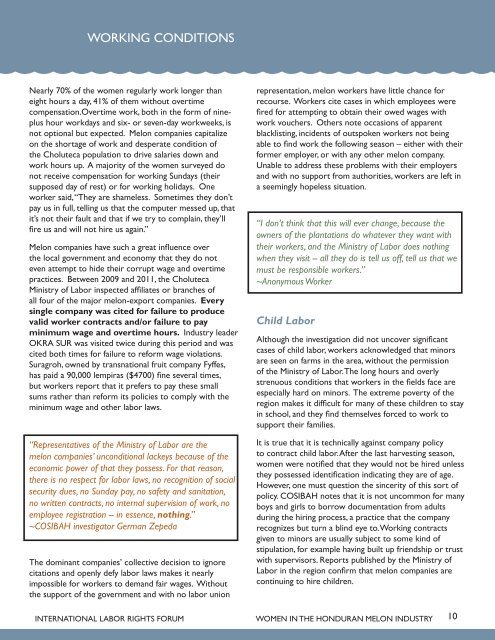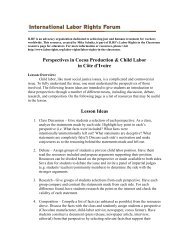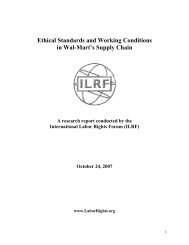Women in the Honduran Melon Industry - International Labor Rights ...
Women in the Honduran Melon Industry - International Labor Rights ...
Women in the Honduran Melon Industry - International Labor Rights ...
Create successful ePaper yourself
Turn your PDF publications into a flip-book with our unique Google optimized e-Paper software.
WORKING CONDITIONSNearly 70% of <strong>the</strong> women regularly work longer thaneight hours a day, 41% of <strong>the</strong>m without overtimecompensation.Overtime work, both <strong>in</strong> <strong>the</strong> form of n<strong>in</strong>eplushour workdays and six- or seven-day workweeks, isnot optional but expected. <strong>Melon</strong> companies capitalizeon <strong>the</strong> shortage of work and desperate condition of<strong>the</strong> Choluteca population to drive salaries down andwork hours up. A majority of <strong>the</strong> women surveyed donot receive compensation for work<strong>in</strong>g Sundays (<strong>the</strong>irsupposed day of rest) or for work<strong>in</strong>g holidays. Oneworker said, “They are shameless. Sometimes <strong>the</strong>y don’tpay us <strong>in</strong> full, tell<strong>in</strong>g us that <strong>the</strong> computer messed up, thatit’s not <strong>the</strong>ir fault and that if we try to compla<strong>in</strong>, <strong>the</strong>y’llfire us and will not hire us aga<strong>in</strong>.”<strong>Melon</strong> companies have such a great <strong>in</strong>fluence over<strong>the</strong> local government and economy that <strong>the</strong>y do noteven attempt to hide <strong>the</strong>ir corrupt wage and overtimepractices. Between 2009 and 2011, <strong>the</strong> CholutecaM<strong>in</strong>istry of <strong>Labor</strong> <strong>in</strong>spected affiliates or branches ofall four of <strong>the</strong> major melon-export companies. Everys<strong>in</strong>gle company was cited for failure to producevalid worker contracts and/or failure to paym<strong>in</strong>imum wage and overtime hours. <strong>Industry</strong> leaderOKRA SUR was visited twice dur<strong>in</strong>g this period and wascited both times for failure to reform wage violations.Suragroh, owned by transnational fruit company Fyffes,has paid a 90,000 lempiras ($4700) f<strong>in</strong>e several times,but workers report that it prefers to pay <strong>the</strong>se smallsums ra<strong>the</strong>r than reform its policies to comply with <strong>the</strong>m<strong>in</strong>imum wage and o<strong>the</strong>r labor laws.“Representatives of <strong>the</strong> M<strong>in</strong>istry of <strong>Labor</strong> are <strong>the</strong>melon companies’ unconditional lackeys because of <strong>the</strong>economic power of that <strong>the</strong>y possess. For that reason,<strong>the</strong>re is no respect for labor laws, no recognition of socialsecurity dues, no Sunday pay, no safety and sanitation,no written contracts, no <strong>in</strong>ternal supervision of work, noemployee registration -- <strong>in</strong> essence, noth<strong>in</strong>g.”~COSIBAH <strong>in</strong>vestigator German ZepedaThe dom<strong>in</strong>ant companies’ collective decision to ignorecitations and openly defy labor laws makes it nearlyimpossible for workers to demand fair wages. Without<strong>the</strong> support of <strong>the</strong> government and with no labor unionrepresentation, melon workers have little chance forrecourse. Workers cite cases <strong>in</strong> which employees werefired for attempt<strong>in</strong>g to obta<strong>in</strong> <strong>the</strong>ir owed wages withwork vouchers. O<strong>the</strong>rs note occasions of apparentblacklist<strong>in</strong>g, <strong>in</strong>cidents of outspoken workers not be<strong>in</strong>gable to f<strong>in</strong>d work <strong>the</strong> follow<strong>in</strong>g season – ei<strong>the</strong>r with <strong>the</strong>irformer employer, or with any o<strong>the</strong>r melon company.Unable to address <strong>the</strong>se problems with <strong>the</strong>ir employersand with no support from authorities, workers are left <strong>in</strong>a seem<strong>in</strong>gly hopeless situation.“I don’t th<strong>in</strong>k that this will ever change, because <strong>the</strong>owners of <strong>the</strong> plantations do whatever <strong>the</strong>y want with<strong>the</strong>ir workers, and <strong>the</strong> M<strong>in</strong>istry of <strong>Labor</strong> does noth<strong>in</strong>gwhen <strong>the</strong>y visit -- all <strong>the</strong>y do is tell us off, tell us that wemust be responsible workers.”~Anonymous WorkerChild <strong>Labor</strong>Although <strong>the</strong> <strong>in</strong>vestigation did not uncover significantcases of child labor, workers acknowledged that m<strong>in</strong>orsare seen on farms <strong>in</strong> <strong>the</strong> area, without <strong>the</strong> permissionof <strong>the</strong> M<strong>in</strong>istry of <strong>Labor</strong>. The long hours and overlystrenuous conditions that workers <strong>in</strong> <strong>the</strong> fields face areespecially hard on m<strong>in</strong>ors. The extreme poverty of <strong>the</strong>region makes it difficult for many of <strong>the</strong>se children to stay<strong>in</strong> school, and <strong>the</strong>y f<strong>in</strong>d <strong>the</strong>mselves forced to work tosupport <strong>the</strong>ir families.It is true that it is technically aga<strong>in</strong>st company policyto contract child labor. After <strong>the</strong> last harvest<strong>in</strong>g season,women were notified that <strong>the</strong>y would not be hired unless<strong>the</strong>y possessed identification <strong>in</strong>dicat<strong>in</strong>g <strong>the</strong>y are of age.However, one must question <strong>the</strong> s<strong>in</strong>cerity of this sort ofpolicy. COSIBAH notes that it is not uncommon for manyboys and girls to borrow documentation from adultsdur<strong>in</strong>g <strong>the</strong> hir<strong>in</strong>g process, a practice that <strong>the</strong> companyrecognizes but turn a bl<strong>in</strong>d eye to. Work<strong>in</strong>g contractsgiven to m<strong>in</strong>ors are usually subject to some k<strong>in</strong>d ofstipulation, for example hav<strong>in</strong>g built up friendship or trustwith supervisors. Reports published by <strong>the</strong> M<strong>in</strong>istry of<strong>Labor</strong> <strong>in</strong> <strong>the</strong> region confirm that melon companies arecont<strong>in</strong>u<strong>in</strong>g to hire children.INTERNATIONAL LABOR RIGHTS FORUMWOMEN IN THE HONDURAN MELON INDUSTRY10
















